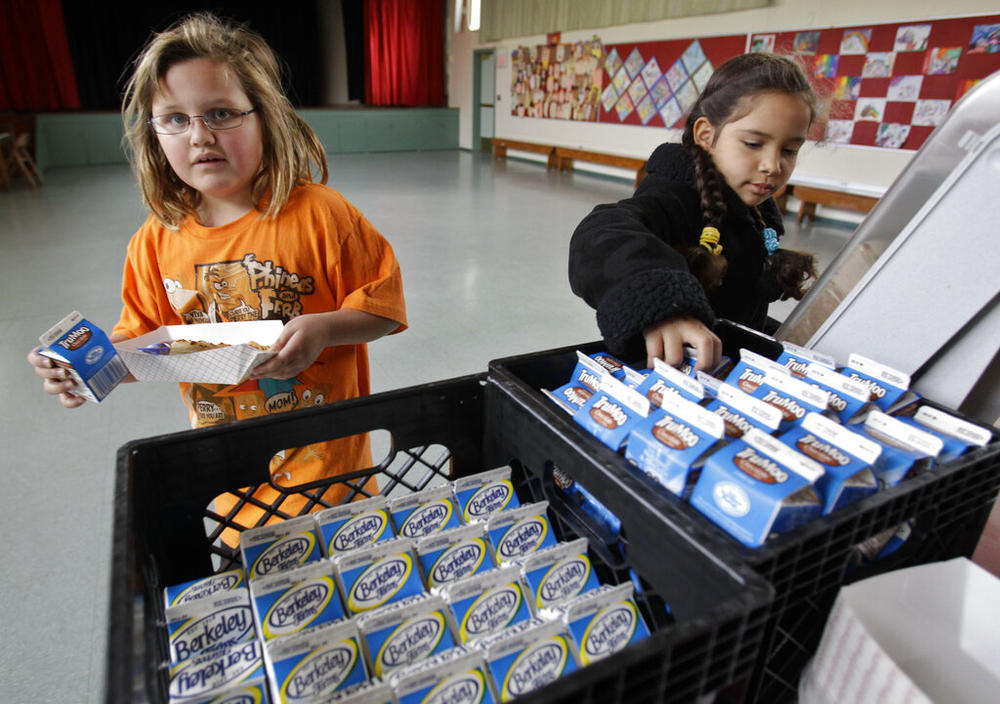
Section Branding
Header Content
Georgia Today: Clean power study; Metro Atlanta population growth; WIC Nutrition study
Primary Content
LISTEN: On the Thursday, Aug. 10 edition of Georgia Today: A new study on clean energy shows Georgia Power still has a ways to go; the population of Metro Atlanta crosses the 5 million mark; and we speak with one of the conductors of a study on the USDA's WIC program.

Peter Biello: Welcome to the Georgia Today podcast from GPB News. Today is Thursday, Aug. 10. I'm Peter Biello. On today's episode, a new study on clean energy shows Georgia Power still has a ways to go. The population of metro Atlanta crosses the 5 million mark. And we speak with one of the conductors of a study on the USDA's nutrition program for Women, Infants and Children. These stories and more are coming up on this edition of Georgia Today.

Story 1:
Peter Biello: Georgia Power says it's making progress toward carbon neutrality, with plans to retire all but one of its coal-fired power plants and double its renewable energy portfolio. But a report on carbon neutrality in the South released yesterday by a clean energy group suggests the company still needs to make some big changes. GPB's Grant Blankenship reports.
Grant Blankenship: Georgia Power has a state-approved plan to go carbon neutral by 2050. But in their analysis of actual cuts and projected cuts by energy producers, researchers with the Southern Alliance for Clean Energy say they doubt Georgia Power's parent company, the Southern Co., will hit the mark. Study coauthor Maggie Shober:
Maggie Shober: Somewhere around 2030, we really see a kind of flattening out of these emissions. And that's very worrisome. I mean, if we're going to be getting to zero by, you know, anywhere between 2035 and 2050, flat emissions are obviously is not going to get us there.
Grant Blankenship: To get there, they suggest a doubling of renewable energy over what Georgia Power has promised state regulators by 2035. For GPB News, I'm Grant Blankenship in Macon.
Story 2:
Peter Biello: State Labor Commissioner Bruce Thompson says his office has found more than $105 million that should have been turned over to state and federal treasuries by his predecessor. GPB's Donna Lowry reports.
Donna Lowry: Thompson says his office discovered the unremitted dollars during a comprehensive internal audit and has now turned the money over to the state. The $105 million is from administrative fees and penalties.
Bruce Thompson: And the full impact of this alleged fraudulent activity is yet to be completely realized, as several important files and records are missing or unavailable. It appears evident that several state and federal statutes have been violated by this previous administration.
Donna Lowry: In a statement, former Labor Commissioner Mark Butler called Thompson's allegations derogatory, false and political theater. He says he knew about the funds and handled them according to the advice of the labor department's legal counsel. For GPB News, I'm Donna Lowry in Atlanta.

Story 3:
Peter Biello: Metro Atlanta's population hit 5.16 million between April 2022 and April of this year. The Atlanta Regional Commission reported the 11-county Atlanta region added more than 66,000 residents during that time period. The commission's chief analyst says the increase is fueled by strong employment growth. The city of Atlanta, Cherokee, Forsyth and Henry counties had the fastest rate of population increase.
Story 4:
Peter Biello: State public health officials say they're taking steps to speed up the processing of medical marijuana cards since the opening of new dispensaries created a backlog of applications. A spokesperson for the Department of Public Health said yesterday that the agency has added a call center, started shipping cards daily and doubled the number of locations where residents can pick them up. Dispensaries of low-THC medical cannabis oil started opening in Georgia in April, years after state lawmakers approved them.

Story 5:
Peter Biello: Lightning scientists estimate that about 600,000 lightning events took place in Georgia on Sunday and Monday when severe storms swept across the state. Officials with Finland-based weather monitoring firm Vice Solar calculate that roughly 96,000 of those events were ground strikes. Those numbers represent about 10% of the state's average annual lightning strikes. The storms left power outages and caused damage statewide. Among the Georgians dealing with the storm's aftermath are those who care about Atlanta's Grant Park, including Grant Park Foundation director Michelle Blackmon. She says 21 trees in the park came down, causing about $20,000 in damage.
Michelle Blackmon: Doing some repair pruning to some of the trees that were damaged and repairing landscape that has been messed up. All of those things are what we're going to put our money to over the next month.
Peter Biello: The foundation is seeking donations and help with cleanup, including work to repair a historic fountain and its surrounding fence.
Story 6:
Peter Biello: Some U.S. Army soldiers stationed in Southeast Georgia can now pursue master's degrees without having to leave their base. GPB's Benjamin Payne reports.
Benjamin Payne: A new partnership between the Army and Georgia Southern University is bringing a handful of graduate programs this fall to Fort Stewart, near Hinesville and Hunter Army Airfield in Savannah. There qualified soldiers and veterans can pursue an MBA master of science in IT or health administration or a master of arts in professional communication and leadership. Olivia Penrod is an Army education services officer.
Olivia Penrod: The classes will be right there. They won't have to leave the installation. It's helpful to have those face-to-face classes so that you can get that assistance right then and there, as opposed to online and the, you know, some of the virtual challenges that come with online education.
Benjamin Payne: The new on-base degree programs are also open to Army family members. For GPB News, I'm Benjamin Payne.
Story 7:
Peter Biello: The United Steelworkers Union said today that member employees at a tire manufacturing plant in Macon have ratified a four-year contract. It's the first union contract covering about 300 workers at Kumho Tire since federal officials recognized the union there two years ago. Union officials say the contract promises better pay and working conditions.

Story 8:
Peter Biello: The Department of Veterans Affairs says 34,000 Georgians have filed claims under a law turning a year old today that expanded benefits for certain medical conditions. GPB's Orlando Montoya reports the agency finds many veterans are still unaware they're eligible.
Orlando Montoya: The benefits relate to conditions connected to burn pits that were used to destroy trash and potentially toxic material. Atlanta regional coordinator for the program, Lauren Ruchin, says before the law, veterans had to fight to prove adverse health conditions were connected to burn pits.
Lauren Ruchin: Now they're just able to. So "Here's my discharge paperwork that shows I was in Vietnam during this time frame, and here's my diagnosis of hypertension" so that they can presume that that is related to it.
Orlando Montoya: President Biden on Thursday celebrated the program, the largest expansion of veterans assistance in decades. For GPB News, I'm Orlando Montoya.
Story 9:
Peter Biello: Gov. Brian Kemp has named a new state economist. Kemp today appointed Robert Bushman of Georgia State University's public finance research cluster to the position. The state economist plays a central role in the development of the state's annual budget.
Story 10:
Peter Biello: The USDA's Special Nutrition Program for Women, Infants and Children, commonly known as WIC, is meant to provide pregnant and postpartum women, infants and children under five years old with a solid base of healthy foods. But when children age out of the program, they may suddenly lose access to those foods. A new study conducted at UGA aims to quantify the nutritional loss these kids face. Associate professor of agricultural and applied economics, Travis Smith, helped conduct the study and he's with me now.
Travis Smith: Thank you, Peter.
Peter Biello: So your study managed to put a number on how much nutritional value kids lost when they age out of work. What was that number?
Travis Smith: That's right. We find that when kids age out of work and they have yet to enter kindergarten and kindergarten, they are provided with school meals that their diet quality declines by up to 20% on average.
Peter Biello: And how did you determine the loss was 20%?
Travis Smith: The way the WIC program works is that you have these benefits until you turn 5 years old and the month after you turn 5, you lose benefits. So we're effectively comparing kids' quality of the food that they're consuming. So this is reports of food that the kids are actually eating just before they age out of WIC and just after they age out of WIC. And then we additionally compare those that have seamlessly gone into school. So they're in kindergarten versus those that are not. And so that's where we're able to use those differences.
Effectively, what we're using is the randomness of when kids are born, right? So if your, if your child was what they call "a late school starter" — so this would be a kid that's born in the fall or winter in most states like the state of Georgia — they would miss the deadline to start kindergarten. So they would turn 5. They wouldn't be in kindergarten. It would be sometime in the fall or winter. They would lose access to WIC. They would not have access to school meal programs. And that's where we see the decline. And for these kids that seamlessly come out of WIC and go into school food programs, we see no effects at all.
Peter Biello: So you found that as of 2020, there were about 2 million children in the Wake program. About half a million were four years old. And most of those kids would lose work before going into kindergarten. Now, some lost it for 11 months. Some didn't lose it for very long during that lost period. What kind of food choices were parents making for their kids?
Travis Smith: Yeah, so we did look at what, you know, where are the is this drop in dietary quality coming from? So just to back up how this is measured, this comes from nutritionists. They have this index called the Healthy Eating Index. And what that does is that you can imagine if you were to tell me all the foods that you ate yesterday, I could score you on how closely you aligned to the dietary guidelines for American citizens like, you know, the food guide pyramid or the myplate. And so as you eat, as you get closer, the recommendation for fruits, for example, than you can get, you can Max, you can max out the fruit score. And we do this for all the different components of 13 different components. And so we looked at the individual components to see where is this coming from. And we saw that it mainly came from the healthy components, right? So this would be parents switching from buying, getting the whole grains through the weight program to switching to buying refined grains with their own money after they've lost work. Another one that we saw would be the weight program provides a $9 per month cash voucher to buy fresh produce. And so parents could switch from the fresh produce to say, like canned fruit with sirup in it. And so as you go down all these different items, the switching from the healthier items that are provided through work to the not as healthy but cheaper alternatives, that all adds up to a 20% decline.
Peter Biello: Mm hmm. And you write in the study that it may not seem like 20% is a big deal, but for kids that age, it really is. Tell us why.
Travis Smith: There's this whole nutrition literature, a long literature from nutritionists that show what you know, Most listeners, if you've had small kids like I do, or if you've been around small kids, you know, it takes a lot of work to get kids to eat healthfully, right, or to try a new food like broccoli. And so the weight program is providing this opportunity for parents to have these healthy foods and have these repeated exposures for kids. And you can build up this kind of nutrition capital, so to speak. But we also know from the nutrition literature and again, anecdotally, you know, most parents would know this is that it's quite easy for kids to have a reversion, right, to say, oh, well, I don't need to have the broccoli. I'd rather have the French fries. Right. And then that's really hard to overcome once you slip down that way. So for these kids that have been on weight for years, building up this nutrition capital, and then all of a sudden just because of their birthday is, you know, happens to be in the fall or the winter and their parents are not able to afford those healthier versions of food that was provided through, which you can have this reversion that can happen. Quite quickly and it could take some time to get back up to that trend that they were on.

Peter Biello: One way, as you write, to keep kids on work longer or to keep them on work nutrition levels longer would be a policy fix, a so-called kindergarten roll off, which was proposed in the House and Senate in 2021. How would that fix the problem?
Travis Smith: Yeah, So yeah, this was proposed in 2021. It's been proposed again since our published. Our study was published in just last May in 2023. And actually it's been proposed numerous times in Congress before. And I'll just note that it's bipartisan. There's Democrats and Republicans that support this bill. It's just never made it out of the out of out of the committee. So we're talking about a very, very small amount to allow kids to stay on on work until they enter kindergarten. That would allow this seamless transition and maintained air quality, because that's what we find for the kids that are on work and transition into the school meal program seamlessly. There's no reduction in the quality of their diets.
Peter Biello: Associate professor of agricultural and applied economics Travis Smith is co-lead of a study on what happens when kids age out of WIC, the USDA Special Supplemental Nutrition Program for Women, Infants and Children under 5. Travis, thank you very much for speaking with me.
Travis Smith: Thank you, Peter.
Story 11:
Peter Biello: In sports: In baseball, the Braves beat the Pirates yesterday, but just barely. Final score, 6 to 5. Michael Harris II tagged up on a sac fly, but the pirates argued he left third base before the ball was caught. The Braves challenged that interpretation and the umpires ultimately saw it the Braves' way, giving the Braves the edge. Also noteworthy, Ronald Acuña Jr had three hits on the night, and that is after being hit by pitch in the elbow the day before and having to leave the game early. And today, the Braves played the final game of the four-game series, losing to the Pirates 7 to 5. The Braves now head to New York for a three-game series against the Mets before returning home on Monday to start a three-game series against the New York Yankees.
And that is it for this edition of Georgia Today. If you want to learn more about these stories, go to GPB.org/news. And don't forget to subscribe to this podcast. We'll be back with you tomorrow afternoon. If you have feedback or a story idea, we would love to hear from you. Send us an email. The address is GeorgiaToday@GPB.org. I'm Peter Biello. Thanks again for listening. We'll see you tomorrow.
---
For more on these stories and more, go to GPB.org/news



